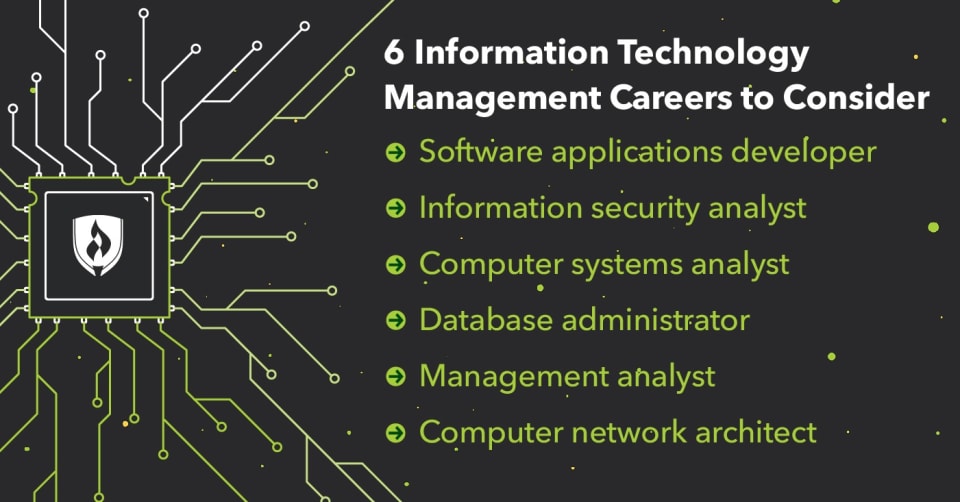
The job prospects for Information Technology (IT) Management are robust and growing, fueled by the increasing reliance on technology in every aspect of business. IT managers are pivotal in ensuring that technology aligns with organizational goals, streamlining operations, and maintaining system security.
1. Increasing Demand for IT Managers
- Digital Transformation: Companies need IT managers to lead the adoption of advanced technologies like cloud computing, AI, and big data analytics.
- Cybersecurity Concerns: Growing risks demand IT managers with expertise in securing systems and data.
- Globalization and Remote Work: The rise of hybrid work models requires efficient IT infrastructure and management.
- Regulatory Compliance: IT managers play a crucial role in ensuring organizations meet data privacy and security standards (e.g., GDPR, HIPAA).
The U.S. Bureau of Labor Statistics (BLS) projects a 16% growth in IT management roles from 2021 to 2031, much faster than the average for other professions.
2. Key Roles in IT Management
- IT Manager/Director: Oversees IT operations, budgeting, and team management.
- Chief Information Officer (CIO): Focuses on strategic alignment of IT with business goals.
- Chief Technology Officer (CTO): Leads innovation and technology adoption strategies.
- IT Project Manager: Manages specific IT projects, ensuring timely delivery and quality.
- Network and Systems Manager: Maintains and optimizes IT infrastructure.
- IT Security Manager: Develops and enforces cybersecurity policies.
- Data Center Manager: Manages data storage, processing, and server maintenance.
3. Industries Hiring IT Managers
- Healthcare: Electronic health records, telemedicine, and patient data management.
- Finance: Secure payment systems, trading platforms, and fraud prevention.
- Retail and E-commerce: IT infrastructure for online platforms and logistics.
- Education: Managing learning management systems and virtual classrooms.
- Government and Defense: Secure networks and mission-critical systems.
- Technology Companies: Managing product development and IT services.
4. Skills in Demand
Technical Skills:
- IT Infrastructure: Understanding of servers, networks, and cloud systems.
- Cybersecurity: Knowledge of firewalls, intrusion detection, and risk management.
- Data Management: Proficiency in databases, data centers, and analytics.
- Cloud Platforms: AWS, Azure, and Google Cloud experience.
Management Skills:
- Project Management: Familiarity with methodologies like Agile, Scrum, or Waterfall.
- Budgeting and Cost Control: Managing IT budgets effectively.
- Team Leadership: Leading diverse teams of developers, analysts, and technicians.
- Vendor Management: Negotiating with third-party service providers.
5. Certifications to Boost IT Management Careers
- Technical Certifications:
- CompTIA Network+ or Security+.
- Cisco Certified Network Professional (CCNP).
- AWS Certified Solutions Architect.
- Microsoft Certified: Azure Solutions Architect Expert.
- Management-Focused Certifications:
- Project Management Professional (PMP).
- Certified Information Systems Security Professional (CISSP).
- ITIL Foundation (Information Technology Infrastructure Library).
- Certified ScrumMaster (CSM).
6. Salary Expectations
- IT Manager: $90,000–$130,000/year.
- IT Director: $120,000–$180,000/year.
- CIO/CTO: $180,000–$300,000/year or more in large organizations.
- IT Project Manager: $85,000–$140,000/year.
7. Emerging Trends in IT Management
- Cloud-First Strategies: IT managers must oversee migration and optimization for cloud platforms.
- Artificial Intelligence: Managing AI tools for business process automation and decision-making.
- Cybersecurity Leadership: Enhanced focus on securing IT infrastructure against evolving threats.
- DevOps and Agile Practices: Integrating development and operations for faster delivery cycles.
- IoT Management: Handling connected devices and the data they generate.
8. Benefits of a Career in IT Management
- High Demand: A critical role across industries ensures job security.
- Lucrative Salaries: IT managers are among the highest-paid professionals in the tech sector.
- Leadership Opportunities: Roles often lead to executive positions like CIO or CTO.
- Diverse Career Paths: Opportunities to specialize in areas like security, infrastructure, or project management.
9. Challenges in IT Management Careers
- Fast-Paced Environment: Staying updated with rapid technological changes is essential.
- High Stakes: System failures or breaches can have significant consequences.
- Team Management: Balancing technical and interpersonal skills to manage diverse teams.
- Budget Constraints: Delivering results within limited financial resources.
10. How to Prepare for a Career in IT Management
- Education: A bachelor’s degree in IT, Computer Science, or a related field is standard. An MBA with a focus on IT management can enhance prospects.
- Experience: Many IT managers start as software developers, network administrators, or analysts before transitioning into leadership roles.
- Networking: Join professional organizations like the Association of Information Technology Professionals (AITP) or attend tech conferences.
- Build Soft Skills: Communication, problem-solving, and negotiation skills are crucial.
11. Long-Term Outlook
As technology continues to evolve, IT managers will play a central role in driving innovation and ensuring smooth operations. Emerging areas like quantum computing, sustainability tech, and AI-driven automation will further expand opportunities.
The combination of high demand, leadership potential, and strong compensation makes IT management a rewarding and future-proof career choice.




